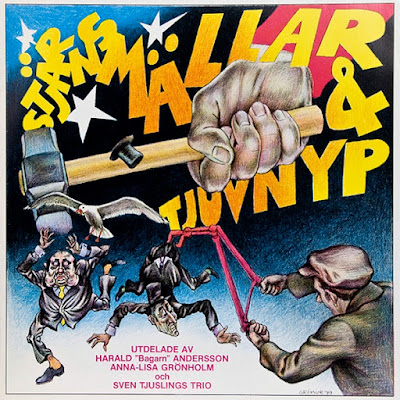
Swedes of certain generations probably
remember Bernt Egerbladh hosting a couple of TV series in the 70's
and 80's, in which he interviewed other people and
remembered his own past. Perhaps it would surprise those that Egerbladh makes
an appearance here on this blog.
He was a noted jazz pianist long before the TV series with a discography going back to the
early 60's. His debut on record came in 1962 with ”Fanfar!”, an
album split with Lasse Lystedt Quintet. Egerbladh favoured a lyrical
tone in the Jan Johansson tradition, but he also harboured
pronounced modernist leanings early on, as demonstrated on the
1965 title track from ”Schizo”, his first album of his own. His solo output is surprisingly slim, but he
was a beloved session musicians, playing on records by and/or writing
music for Doris, Gimmicks, Heta Linjen, Ann-Kristin Hedmark, Rune
Andersson, James Hollingworth, and Lill Lindfors. Some of these names
may not mean much to a non-Swede, but they present a wide span of
musical styles and interests. One of his best known tracks is ”You
Never Come Closer” on Doris's sole album, a magnificent slice of
uneasy fringe psychedelia. Considering his variety as songwriter as
well as performer, this progg blog feature may not be that surprising
at all. Egerbladh – who died in 2004 – was a curious explorer
happy to take part in projects way outside the jazz world that
fostered him.

Nybyggarland (Sonet, 1973)
Instrumental
International relevance: **
With all the tracks adapted from
folk tunes of Northern Sweden, it's easy to see ”Nybyggarland”
as a modernization of sorts of Jan Johansson's massively successful
”Jazz på svenska” released almost ten years earlier. But
”Nybyggarland” has a wider sound palette with Ulf Andersson
(EGBA, Feta Heta Linjen) and Ahmadu Jarr on congas. The album starts
out cunningly straight, but by the third track ”Vaggvisa från
Norrbotten”, things are getting slightly strange. A foreboding
organ creeps into one channel, a cembalo sounding instrument
searches tinkling for a home in the other. About halfway in, the piano
goes off into unpredicted terrain, as if it breaks free from the
melodic centre and breaks up into modal streams.
The melody of the
title track is more like a suggestion of what to come, and soon gives way for a bass
riff that establishes a strange moving rhythm building up to a
mysterious, almost Arbete & Fritid-like bounce. The albums really
goes off the rails with the next track ”Ja, kom då!” where Ulf
Andersson's flute leads the way into a gurgling, pulsating and flat
out trippy haze deepened by Egerbladh's druggy organ competing
with his almost Mwandishi-styled electric piano. The album sort of
withdraws a bit after that, but it has one surprise left,
”Hjortronmyren”, with a simple and persistent horn riff fleshing out Ahmadu Jarr's conga beat.
There's nothing bad on this album, but
had the entire disc been like those three tracks I've singled out,
this would have been a full-on masterpiece. Now, it's a good, maybe
even great, album with some truly out-of-the-ordinary moments.

Kristallen den fina (CBS, 1975)
Instrumental
International relevance: **
”Kristallen den fina” works as a
sister volume to ”Nybyggarland” insofar it's built around Swedish
traditional tunes; only two tracks are original compositions but they
retain a very folky feel and thus slip seamlessly into the program. The
title track will be familiar to some readers as both Harvester and Made In Sweden used the
melodic theme to their own ends. This version features what may sound
like Jojje Wadenius singing along with his guitar in his typical fashion, but the guitarists
here are Jan Schaffer and Jan Tolf (Egba, Häxmjölk).
”Barkbrödlåten” in turn is one of the high points on
Kebnekaise's second album, and it's a stand-out also in this
collection, largely because of Schaffer's really freaky guitar work.
(Or is it Tolf messing about? Hard to tell, but it sounds more like something Schaffer would do.) It's also the track in
this collection most likely to appeal to the average progg listener.
Apart from that track, this album isn't as bonkers as the best stuff
on ”Nybyggarland”, but it's a highly enjoyable album with
very fine solo and ensemble playing. The folk material is strong and
typically melancholic, and well suited for the careful jazz treatment represented here.

African Suite (Sonet, 1976)
Instrumental
International relevance: ***
Anyone expecting more of that
bittersweet wistfulness of the two previous albums will be sorely
disappointed with ”African Suite”. As the title say, this time
Egerbladh looked to Africa for inspiration. It's a far more rousing
experience than any of the preceding albums, and it's also the one overall
closest to progg if you by progg mean Archimedes Badkar, Bitter Funeral Beer Band and Spjärnsvallet. (Christer Bothén's 1983
”Trancedance” album with Bolon Bata also leaps to mind.) This
demanded a larger ensemble, so Egerbladh drummed up an all-star line-up including several progg celebrities such as Ahmadu Jarr
(again), Stefan Brolund (Egba, Oriental Wind, Pop Workshop), Lennart Åberg (Rena Rama, Häxmjölk, Bengt-Arne Wallin), and Malando
Gassama (Ablution/Baltik, Häxmjölk). ”African Suite” is, for
some reason, more cohesive than the other two in this trio of
albums, which isn't to say it's at all samey -- on the contrary, it's a varied collection of tracks. The two I like the most are also
the two most jubilant ones, ”Welcome To The Gambia” and ”Fire
Dance”. Well, maybe I should mention the forceful ”Worksong”
too, with its compelling beat constantly pushing forward relentlessly. But there
really aren't any weak moments here. It helps though if you already
like the African leanings of the abovementioned bands. If you do,
this will be a nice discovery if you haven't heard it already.
Nybyggarland full album playlist
Kristallen den fina full album playlist
African Suite full album playlist






























